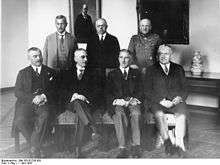Magnus von Braun (senior)
| Magnus Freiherr von Braun | |
|---|---|
| Born |
Magnus Alexander Maximilian Freiherr von Braun February 7, 1878 Neucken/Pr. Eylau, East Prussia, German Empire |
| Died |
August 29, 1972 (aged 94) Oberaudorf, West Germany |
| Nationality | German |
| Occupation | Politician, civil servant |
| Political party | DNVP[1] |
| Spouse(s) | Emmy von Quistorp (m. 1910–59) |
| Children |
|
Magnus Alexander Maximilian Freiherr von Braun[2][3] (7 February 1878 – 29 August 1972) was a German jurist and politician.[4]
Biography
Magnus von Braun was born at his family's manor of Neucken, an estate the von Brauns had owned since 1803,[5] near Pr. Eylau (present-day Dubki near Bagrationovsk, Russia) in East Prussia to Maximilian von Braun (1833–1918) and Eleonore (née von Gostkowski) (1842–1928).[3][6]
He studied law at the Universities of Göttingen and Königsberg and joined the Prussian civil service in 1905, at first at the department of trade and commerce in Berlin.
With his father's death in 1918, he inherited the title of Freiherr (equivalent to Baron); he lost it again in 1919 when the Weimar Constitution abolished the nobility, and "Freiherr" became simply part of his surname.
Between 1911 and 1915 he was the district chief executive (Landrat) of the Kreis Wirsitz (Province of Posen) and returned to Berlin in 1915 to the department of interior.[4]
In September 1917 Braun became the first chief press officer of the Reich Chancellery[7][8] and later the head of the political department of the military administration of Vilnius.[4]
He became the Stadthauptmann (head of the administration) of Daugavpils in 1918 and commissarial Police President of Stettin (now Szczecin, Poland) in 1919. Braun then worked again at the department of interior and became the President of the Governorate of Gumbinnen.
He was dismissed from the civil service after the Kapp Putsch in 1920 for his role in the coup.[9]

Braun returned to his family's manor in East Prussia and was active in several agricultural organisations like the Raiffeisen cooperative.
In 1930 he became the Vice President of the Reichsverband der Landwirtschaftlichen Genossenschaften (Association of Agricultural Cooperatives).[10]
On 1 June 1932 he was appointed Weimar Germany's Minister of Nutrition and Agriculture and Reichskommissar for Eastern Aid (Osthilfe) in the cabinet of Chancellor Franz von Papen, a position he kept under Chancellor Kurt von Schleicher until 28 January 1933.[11]
After the Nazis came to power on 30 January 1933, Braun moved to his manor in Silesia, which after World War II became part of Poland and Braun was expelled to Western Germany in 1946.[8]
Braun followed his son Wernher to the United States in 1947, but returned to Germany in 1952, where he died in 1972 at Oberaudorf.
Braun married Emmy von Quistorp (1886–1959) on 12 July 1910. They had three sons:
- Sigismund von Braun (1911–1998), diplomat
- Wernher von Braun (1912–1977), rocket scientist
- Magnus von Braun (1919–2003), industrial manager
References
- ↑ Germany: the long road west, Volume 1 (in German). Heinrich August Winkler, Alexander Sager. 2006. Retrieved 2009-08-24.
- ↑ Regarding personal names: Freiherr is a former title (translated as Baron). In Germany since 1919, it forms part of family names. The feminine forms are Freifrau and Freiin.
- 1 2 worldroots.com
- 1 2 3 Magnus Freiherr von Braun, Von Ostpreußen bis Texas. Erlebnisse und zeitgeschichtliche Betrachtungen eines Ostdeutschen. Stollhamm 1955 (also published as: Weg durch vier Zeitepochen. Vom ostpreußischen Gutsleben der Väter bis zur Weltraumforschung des Sohnes in Amerika. Limburg, 1965
- ↑ Michael J. Neufeld: Von Braun, Dreamer of Space, Engineer of War, ISBN 0-307-38937-5
- ↑ Quistorp family
- ↑ Rudolf Stöber. Die erfolgverführte Nation (in German). Retrieved 2009-05-16.
- 1 2 Michael Kümper. Makom, Orte und Räume im Judentum (in German). Retrieved 2009-05-16.
- ↑ Die Protokolle des Preussischen Staatsministeriums 1817 – 1934/38 (in German). Retrieved 2009-05-16.
- ↑ Gerhard Schulz. Zwischen Demokratie und Diktatur (in German). Retrieved 2009-05-16.
- ↑ Heinrich August Winkler. Weimar, 1918–1933 (in German). Retrieved 2009-05-16.
External links
| Wikimedia Commons has media related to Magnus von Braun. |